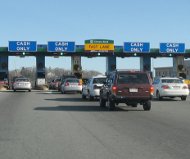7/16/2012
Massachusetts Supreme Court Upholds Diversion of Toll Road RevenueToll road revenue does not have to be invested in roads used by tollpayers, according to Massachusetts Supreme Court.

Money raised from tolls on one road can be diverted to fund projects on unrelated, untolled bridges, roads and tunnels, the Massachusetts Supreme Judicial Court ruled Thursday. In 1997, the state legislature tapped drivers on the Massachusetts Turnpike for revenue to pay for the "Big Dig," a massive tunnel project in Boston with legendary cost overruns that brought the initial $2.8 billion estimate to a final pricetag of $22 billion.
In 2009, turnpike users sued the turnpike authority over 58 percent of their toll money -- $440 million -- being siphoned off for the expensive tunnel, which they argued changed the money from a "user fee" to a tax under the state constitution. The coalition of motorists and trucking associations behind the suit argued the system was also fundamentally unfair.
"The majority of travelers who use Metropolitan Highway System (MHS) facilities each day pay no tolls at all: MTA collects tolls from only 46 percent of the travelers who use MHS facilities each day, allowing 54 percent of travelers to pay nothing at all for their use of the most expensive part of the MHS," lawyers for the plaintiffs argued. "This court should not hesitate to invalidate a tolling scheme that impermissibly functions like a tax or that unreasonably or disproportionately burdens those who are singled out to pay tolls."
The high court rejected this reasoning, arguing the toll diversion, if a tax, fits squarely within the requirements of the state constitution.
"Where the revenue from such tolls is not applied to the maintenance and repair of highways but are retained without restriction, they are excise taxes," wrote Justice Ralph D. Gants. "The legislature is empowered by Part II, c. 1, sec. 1, art. 4, to impose a highway toll as an excise tax."
The court, however, preferred the theory that the tolls were "user fees" because the payment could be avoided by driving only on nontolled roads.
"The MHS tolls satisfy the third factor, because they were collected to compensate the authority for the expenses incurred in operating the MHS (and limited by statute to the amount necessary to pay those expenses), not to raise revenues for the commonwealth," Gants concluded. "Where, as here, a public authority manages an integrated system of roadways, bridges, and tunnels, and chooses to impose tolls on only some of the roadways and tunnels in an amount sufficient to support the entire integrated system, its purpose does not shift from expense reimbursement to revenue raising simply because the toll revenues exceed the cost of maintaining only the tolled portions of the integrated system... Because we conclude that the tolls collected by the authority on the MHS were fees, and because we conclude that they would still be constitutional excise taxes even if they were taxes, we affirm the dismissal of the plaintiffs' state constitutional claims."


